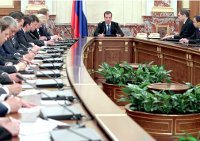New government, new surprises, new chances
The new Russian government was unveiled on Monday, May 21. As it was expected, there were surprising appointments made, but all the surprises were positive. Experts said that it was an ambitious, young, vigorous and yet professional and experienced government.

On May 15th, Prime Minister Dmitry Medvedev presented his suggestions about the personnel and the structure of the new cabinet of ministers to President Putin. They did not expose the list of candidates for ministerial positions at that time "not to incite too much interest," as Medvedev said.
Needless to say that the news generated a variety of prognoses. It was not hard to guess who would leave their offices. As for successors, analysts gave free rein to their imagination.
A number of publications said that some of the candidates publicly refused to work with the new government. The list of names included the head of the Russian Federal Atonic Agency Sergei Kiriyenko, billionaire Mikhail Prokhorov and former Finance Minister Aleksei Kudrin. However, the secretary of the Prime Minister, Natalia Timakova, said that Medvedev had never offered the above-mentioned people to join his government.
"Three-thirds of the government are new people that either appeared recently or would enter the government for the first time," Medvedev said. This detail became the reason that delayed the introduction of the new ministers. "One needs to conduct personal meetings with each of the candidates, and, naturally, to understand their positions, their programs and their readiness to execute their duties," Medvedev said.
As it as expected, the ministers, whose popularity ratings were low, were not included in the new government. It goes about Interior Minister Rashid Nurgaliyev, Healthcare and Social Development Minister Tatiana Golikova, Education and Science Minister Andrei Fursenko. As a result, Nurgaliyev's place was taken by the head of the Interior Affairs Directorate for the City of Moscow, Vladimir Kolokoltsev.
Golikova's ministry was split into the Ministry for Labor and Social Protection and the Healthcare Ministry. They were chaired by Maksim Topilin and Veronica Skvortsova respectively. Two new ministerial positions appeared: Mikhail Abyzov became the Ministry of the Russian Federation for Relations with the "Open Government". Viktor Ishayev, the presidential aide in the Far Eastern administrative district, became the Minister for the Development of the Far East.
Thus, the number of ministers increased from 19 to 21.
Structural changes took place as well. There will be only one First Vice Prime Minister in the new government (Igor Shuvalov preserved this position). The quantity of vice prime ministers remained the same - seven people: Vladislav Surkov (he will also chair the governmental administration), Dmitry Kozak, Dmitry Rogozin and Alexander Khloponin. In addition, ex-assistant to the president Arkady Dvorkovich and vice mayor of Moscow, Olga Golodets were appointed deputy chairpersons of the government.
On the whole, the new government will have 28 people, including two new vice prime ministers and 15 new ministers.
"The new government is a serious signal for the renovation of the administration of the country. The government is ambitious, young and full of energy, yet experienced and professional," scientist of politics Pavel Danilin said.
The presence of Defense Minister Anatoly Serdyukov and Minister for Sport Vitaly Mutko will definitely raise concerns with the Russian opposition. However, this is only a question of personal taste.
During the meeting with the minister, Vladimir Putin wished them luck and stated that they would have to run the program of Russia's development against the background of instability in world economy.
As Dmitry Medvedev said, the government would have to pass the basic package of state programs on key directions of the socio-economic development of the country in the first place. "I'd like to pay special attention to the priority of reaching the demographic indicators that were declared in the program speeches of the political administration of the country," Medvedev said.
Priority No. 2 is the introduction of the three-year budget in the parliament for 2013, 2014 and 2015.
Lev Pravin
Pravda.Ru
Subscribe to Pravda.Ru Telegram channel, Facebook, RSS!


